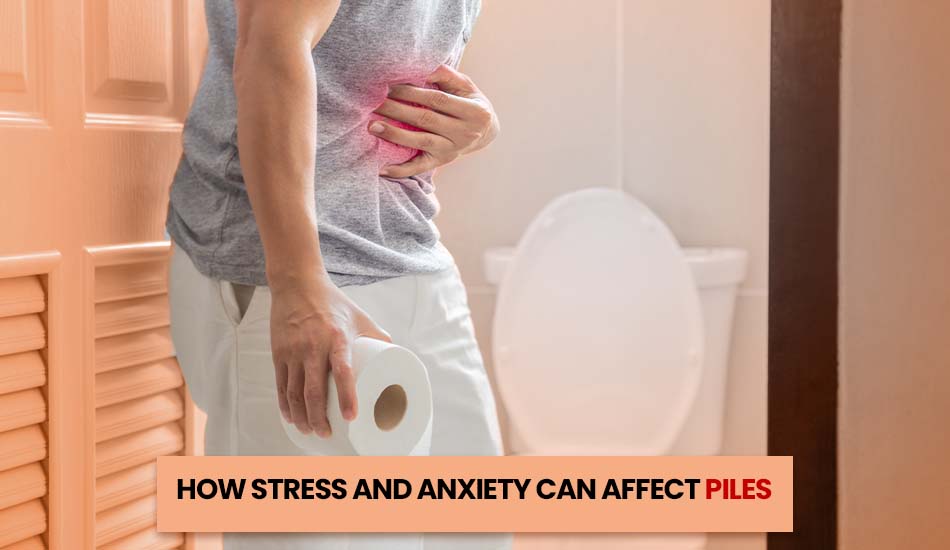
How Stress and Anxiety Can Affect Piles
Wednesday, 5th June 2024Piles, also known as hemorrhoids, are a common condition that can cause significant discomfort. While factors like diet and lifestyle are well-known contributors, the impact of stress and anxiety on piles is often overlooked. Understanding how stress and anxiety can affect piles is crucial for managing and preventing this condition effectively.
The Link Between Stress, Anxiety, and Piles
Stress and anxiety can influence your overall health in many ways, and they can also exacerbate piles. Here are several ways stress and anxiety can impact piles:
1. Digestive Issues
Stress and anxiety can wreak havoc on your digestive system, leading to issues like constipation and diarrhea. Both of these conditions can increase the strain on your rectal veins, contributing to the development and worsening of piles.
- Constipation: Stress can slow down your digestive system, leading to harder stools and difficulty passing them. Straining during bowel movements is a significant risk factor for piles.
- Diarrhea: On the other hand, anxiety can speed up digestion, resulting in frequent, loose stools that can irritate the rectal area and lead to piles.
2. Increased Muscle Tension
When you are stressed or anxious, your body tends to tense up. This muscle tension can include the pelvic floor muscles, which support the rectal area. Constant tension in these muscles can put extra pressure on the veins in the rectum and anus, increasing the risk of piles.
3. Poor Eating Habits
Stress and anxiety often lead to poor eating habits, such as consuming comfort foods that are high in fat and low in fiber. These dietary choices can contribute to constipation and other digestive issues, further increasing the risk of piles.
4. Decreased Physical Activity
People who are stressed or anxious may be less likely to engage in regular physical activity. A sedentary lifestyle can slow down your digestive system and lead to constipation. Regular exercise is important for maintaining healthy bowel movements and reducing the risk of piles.
Managing Stress and Anxiety to Prevent Piles
Addressing stress and anxiety is an important aspect of preventing and managing piles. Here are some effective strategies to help you manage stress and reduce its impact on your health:
1. Exercise Regularly
Regular physical activity is one of the best ways to manage stress and maintain digestive health. Aim for at least 30 minutes of moderate exercise most days of the week. Activities like walking, jogging, yoga, and swimming can help reduce stress and promote regular bowel movements.
2. Practice Relaxation Techniques
Incorporate relaxation techniques into your daily routine to help manage stress and anxiety. Techniques such as deep breathing, meditation, progressive muscle relaxation, and mindfulness can help calm your mind and reduce muscle tension.
3. Maintain a Healthy Diet
Eating a balanced diet rich in fiber can help prevent constipation and keep your digestive system healthy. Include plenty of fruits, vegetables, whole grains, and legumes in your diet. Avoid processed foods, sugary snacks, and excessive caffeine, which can exacerbate stress and digestive issues.
4. Stay Hydrated
Drinking plenty of water is essential for maintaining healthy digestion and preventing constipation. Aim to drink at least 8-10 glasses of water a day, and adjust your intake based on your activity level and climate.
5. Get Enough Sleep
Adequate sleep is crucial for managing stress and maintaining overall health. Aim for 7-9 hours of sleep each night. Establish a regular sleep schedule and create a relaxing bedtime routine to improve the quality of your sleep.
6. Seek Support
If stress and anxiety are affecting your daily life and health, consider seeking support from a mental health professional. Therapy, counseling, and support groups can provide valuable tools and resources for managing stress and anxiety.
Why Choose Shriram Hospital for Piles Treatment?
At Shriram Hospital, we understand the complex relationship between stress, anxiety, and piles. Our experienced team provides comprehensive care that addresses both the physical and emotional aspects of piles. We offer personalized treatment plans to help you manage and prevent piles effectively.
Conclusion
Stress and anxiety can significantly impact your risk of developing piles and exacerbate existing symptoms. By managing stress through regular exercise, relaxation techniques, a healthy diet, and proper hydration, you can reduce the impact of stress on your digestive health. For expert care and treatment, visit Shriram Hospital.



